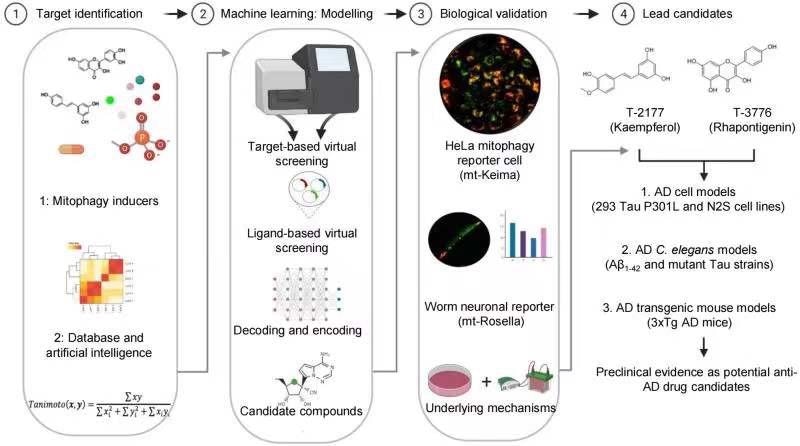Recently, a research team has put together an artificial intelligence (AI)-based virtual screening algorithm and a cross-species Alzheimer’s disease (AD) drug verification system.
 AI-based virtual screening and a cross-species workflow for Alzheimer’s disease drug discovery. (Image Credit: University of Macau).
AI-based virtual screening and a cross-species workflow for Alzheimer’s disease drug discovery. (Image Credit: University of Macau).
The team was guided by Lu Jiahong, associate professor in the Institute of Chinese Medical Sciences (ICMS), University of Macau (UM) in partnership with scientists at the University of Oslo in Norway, and Hangzhou Mindrank Technology Co, Ltd.
The algorithm and the system have effectively detected numerous small-molecule compounds with therapeutic possibilities against AD. The associated research results have been reported online by Nature Biomedical Engineering.
Around 50 million people around the world suffer from dementia, and this number is projected to grow to 152 million by the year 2050. At the moment, the incidence of the disease is as high as 42% among people over the age of 85. Despite the growing incidence, the creation of AD drugs has continued to be ineffective for decades.
Between 2000 and 2017, 33 top pharmaceutical companies invested over USD 600 billion in AD research and drug development, most of the drug developments have been unsuccessful because of the unidentified pathological mechanism of AD.
During the neuronal aging process, mitochondria, the “power plants” inside the cells, carry on amassing damage to escalate the death of nerve cells.
To guarantee that the mitochondria are in good shape, cells use mitophagy, an exceptional quality control system, to selectively eliminate damaged mitochondria, and thereby preserve the health of neurons. Improving mitophagy may be a unique method for treating AD, so there is an urgent necessity to discover new and proficient mitophagy inducers.
The small molecules derived from traditional Chinese medicine (TCM) are structurally different with comparatively low toxic and side effects, so they are an ideal source of drug discovery. The team brought in a machine learning solution to aid this study.
From the university’s small-molecule TCM compound bank that comprises 3,724 natural compounds, scientists segregated 18 compounds. Two out of these 18 compounds, namely rhapontigenin and kaempferol, were established as able to improve memory and cognitive deficiencies in nematode and mouse AD models within a safe dosage range, thus decreasing the pathological phenotype of AD.
In general, the study set up an efficient and achievable AI-based drug discovery program and delivered a new method for the fast development of AD drugs. The research outcome signifies a huge breakthrough in the renewal of TCM.
In the past few years, Prof Lu’s team has carried out systematic studies in the field of autophagy and AD and has published articles in several academic journals such as Molecular Neurodegeneration, Acta Pharmaceutica Sinica B, Autophagy, and Theranostics. These studies have shown the significant role of autophagic dysfunction in the pathogenesis of AD and the prospect of autophagy induction as a new method for treating AD.
The study’s corresponding authors include Lu Jiahong and Associate Professor Evandro Fang Fei at the University of Oslo. Zhuang Xuxu, a doctoral student at UM; Zhangming Niu, the founder of Deruizhiyao Technology Co, Ltd; Xie Chenglong, a postdoctoral fellow at the University of Oslo; and Ai Ruixue, a doctoral student at the University of Oslo, are the co-first authors of the paper.
Prof Shen Hanming and Prof Zheng Wenhua in UM’s Faculty of Health Sciences, as well as postdoctoral fellow Cai Cuizan and master’s student Xie Liming in the ICMS, made vital contributions to this research.
The study received funding from the Science and Technology Development Fund of the Macao SAR (file number: 0128/2019/A3 and 024/2017/AMJ) and UM (file number: MYRG2019-00129-ICMS).
Journal Reference:
Xie, C., et al. (2022) Amelioration of Alzheimer’s disease pathology by mitophagy inducers identified via machine learning and a cross-species workflow. Nature Biomedical Engineering. doi.org/10.1038/s41551-021-00819-5.